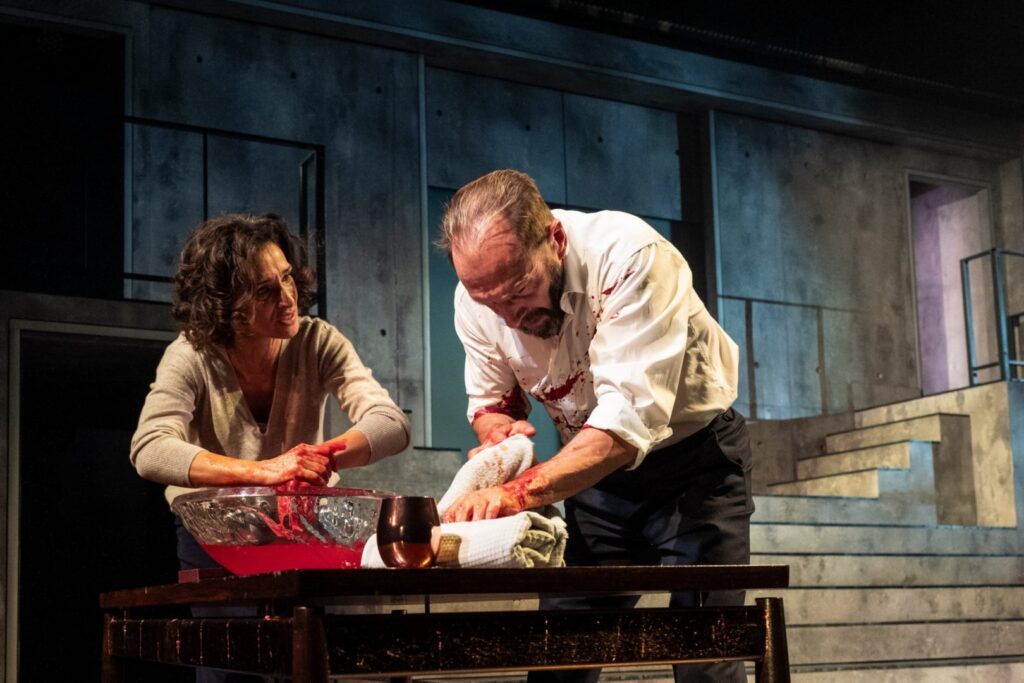
I have seen a couple of Macbeths on stage before, obviously read the play, and more recently Jo Nesbo’s book, part of the “Hogarth” series. All my past experiences blur together to create the Macbeth imprint in my head, so I will readily admit that I cannot discern what exactly Emily Burns adapted in this version, compared to the original. It is hard for me therefore to determine to what extent it was the adaptation, to what extent the scenography and to what extent the acting, but there were themes and thoughts that came to the fore of my mind, that had never quite taken centre stage in the past.
Starting with the three sisters. In the original play, they are referred to as witches only in speech prefixes and stage directions, never so by the characters. And in this version, dressed in Gen-Z chic, they really do not come across that supernatural. They are bored youngsters that want to stir up trouble to fill their day, and then watch on with a smirk as tragedy unfolds. Their words feel much more like social media contagion that entraps you with answers for questions you never in fact had. Or like something out of an American teenage drama, where the cool girls dare the newbie to misbehave. They are manipulative, not prophetic; they want to deconstruct reality for a little bit of fun, not caring about the carnage they will cause, not offering anything new in its wake. The play starts with them, and ends with them. They are the true agency here.
On to Lady Macbeth. I have always found her a formidable character. Played by Indira Varma, the traits are greatly amplified – the determination, the sheer will power to move the agenda forward. It is easy to forget that she is the baddy here. I found myself rooting for her and getting increasingly frustrated with her bumbling husband. The reversal of stereotypical roles was brilliantly done; clearly Lady Macbeth’s wish -unsex me here – was granted. In slinky attire emanating femininity, she is the one ruling the court – the ultimate puppet master.
And that is the third and final observation I had – the evolution of the marital relationship between Macbeth and his wife. Not so much the aforementioned power dynamics – but the feelings they have towards one another. There is love and passion between them at the outset. The wife excited by the prospect of her husband’s promotion – but very much for him, not for the advancement it will bring her. Then comes the frustration and disappointment, when promises and commitments made are not really delivered on. Palpable contempt seethes from Lady Macbeth as she gazes at her spouse and resentment sets in. And then the last stage – the more Macbeth unravels and hunches over under the weight of his guilt, the more she withdraws from him. She becomes more mother than lover as she flinches away from his groping hands, chides and scorns him. The juxtaposition of the physical closeness at the beginning and at the end illustrates the death of her love profoundly.
One tangential thing to add – something that never ceases to amaze me – with actors of this calibre – you listen to Ralph Fiennes and Indira Varma speak to one another in Shakespearean English, and you understand all of it effortlessly. Their mastery of the language, their precise diction – for that alone it is worth going.
As to the setting of the play in a more modern period. It left me somewhat ambivalent. The burnt-out car, the wailing sirens, the blasts etc. All of it was impressive, although I must say I had thought the premise of a warehouse staging would be more ‘immersive’ than what it was. The entrance to the set was superb – apocalyptic in its design and startling – which made the main room and the very aesthetic stage more of a disappointment. The seating felt no different to any theatre – just tighter and more uncomfortable. And yes, the costumes and scenography did create a clear link to all the military conflicts raging across the world today, even if the scene of Macbeth and Macduff having a good old-fashioned sword fight felt somewhat out of place. But would I have not made the same link without the paraphernalia? I am fairly certain I would have. Maybe the one scene where it did hit me more, was Macduff’s family being slaughtered. The children in modern clothes playing on a flight of stairs, the young woman butchered for no reason – this so reminiscent of ‘modern warfare’ where sexual violence has continued across centuries to be used as a weapon of war. And will continue, just as Macbeth will remain relevant and poignant for decades to come.